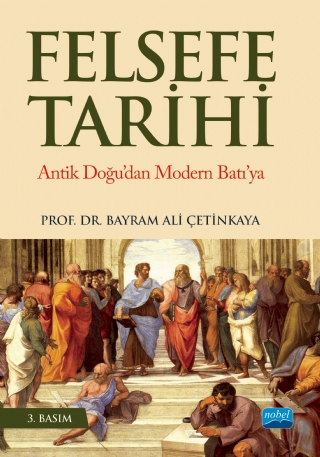History of Philosophy \ 1-1

Dictionary of Philosophy Doctrines and Terms, mainly to prevent conceptual anarchy; in order to fill a large gap in the philosophy dictionary in the market, to arouse interest in philosophical issues, to warn especially young people against the bad and destructive effects and suggestions of negative currents, to show them the roots of these currents, to facilitate and give clues to those who are in the field of philosophy in the research they want to do. has been written. This dictionary; In addition to being a helpful book especially for philosophy teachers, students, and those who are closely or distantly interested in philosophy, it introduces readers from all fields to certain philosophical doctrines.

This book deals with Turkish philosophers who gave lectures at Darü'l-Fünûn between 1908 and 1933 and their understanding of philosophy. Names such as Rıza Tevfik, Mehmet İzzet, Ziya Gökalp, Şekip Tunç, Ziya Somar, Orhan Sadeddin, Baha Tevfik who have left deep traces in our intellectual life and can be considered as examples of cultural continuity are discussed.
Thus, contrary to what is believed, it has been understood that philosophy studies in our country started much earlier than our universities under German influence and that it has a unique character. This work illuminates an important dark area in our culture.
Thus, contrary to what is believed, it has been understood that philosophy studies in our country started much earlier than our universities under German influence and that it has a unique character. This work illuminates an important dark area in our culture.

Among the many definitions of man, perhaps the most accepted definition is the one made by Aristotle. Aristotle, who defines man as a 'thinking creature', begins his Metaphysics with the sentence "Man naturally wants to know". If this is true, that is, if 'wanting to know' is man's most natural activity, the history of humanity is, in a way, the history of thought. And therefore, all sciences should be considered as projections of philosophy in other dimensions of existence.
This approach brings with it the fact that no matter what discipline one works in, one should have an idea about the history of thought.
The main motivation of this study is the acceptance that the history of philosophy is a field that will nourish and strengthen all fields of study.
This approach brings with it the fact that no matter what discipline one works in, one should have an idea about the history of thought.
The main motivation of this study is the acceptance that the history of philosophy is a field that will nourish and strengthen all fields of study.

Our first goal in preparing this voluminous work is to enable our new generations to meet with the creative thoughts of their grandfathers and fathers in the recent past; to enable them to see everything with their own eyes and think with their own minds, and to help them circulate their own ideas. In this regard, we will not first lease our minds to the West or borrow their minds and lie on it. Because not only they are thinking, we are thinking too, we are also making “production ideas”.
Today, Turkey is located in the "periphery", not the center that determines and determines the intellectual agenda in the world, and often acts in a peripheral situation depending on the agendas determined by the center.
Therefore, our second goal is to help pave the way for getting out of the periphery and being at the centre. At the same time, it is to help the revival of our civilization, which we belong to in history, as an alternative, and to contribute to our thought life in its rebuilding.
This book also aims to reveal that contemporary Turkish thought is strong enough to be showcased in the world thought arena. If the development of our intellectual life towards its “natural medium” continues, it is certain that Turkish thought will make a significant contribution to world thought by producing newer and more original ideas. Now, we should leave behind the period of self-evaluation according to the thoughts of Western thinkers, and aim at the level where they can evaluate their own thoughts by looking at our products of thought, as in the past. We must be aware of it, so that we can move on to the periods of producing more of our new and universal ideas.
Today, Turkey is located in the "periphery", not the center that determines and determines the intellectual agenda in the world, and often acts in a peripheral situation depending on the agendas determined by the center.
Therefore, our second goal is to help pave the way for getting out of the periphery and being at the centre. At the same time, it is to help the revival of our civilization, which we belong to in history, as an alternative, and to contribute to our thought life in its rebuilding.
This book also aims to reveal that contemporary Turkish thought is strong enough to be showcased in the world thought arena. If the development of our intellectual life towards its “natural medium” continues, it is certain that Turkish thought will make a significant contribution to world thought by producing newer and more original ideas. Now, we should leave behind the period of self-evaluation according to the thoughts of Western thinkers, and aim at the level where they can evaluate their own thoughts by looking at our products of thought, as in the past. We must be aware of it, so that we can move on to the periods of producing more of our new and universal ideas.